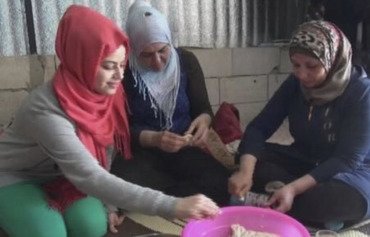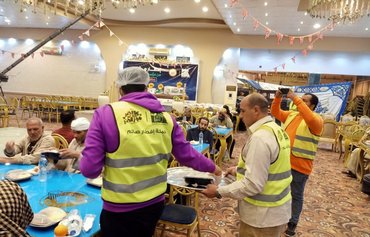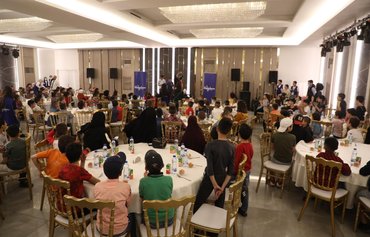Charities, religious and civil society organisations have stepped up their efforts to support Syrian refugees in Lebanon during Ramadan by holding daily iftar banquets and distributing food rations and clothing.
With efforts to create a festive Ramadan atmosphere also extended to low-income Lebanese, it is a common sight to see Lebanese citizens and Syrian refugees breaking the fast together, side by side, at iftar banquets.
At the Ramadan Village tent, a project hosted by the Makhzoumi Foundation on land owned by Dar al-Fatwa in Beirut's Verdun area, 600 people a night can enjoy hot iftar meals served to all comers, regardless of nationality.
"The foundation, which is actively involved throughout the year in social and humanitarian affairs, including providing numerous health and educational services to a large number of Lebanese citizens and Syrian refugees, steps up its initiative during the month of Ramadan," said general manager Samer Safah.
"We have our Ramadan project, the Ramadan Village, where we serve about 2,000 iftar meals to Lebanese citizens and Syrian refugees, some of whom swing by and take the meals home," he told Al-Mashareq.
Another 600 people, most of whom are Syrian refugees residing in Beirut, dine inside the tent at iftar time, he said, noting that the foundation also delivers iftar meals to the homes of poor families.
At Bekaa Valley refugee camps, the foundation delivers meals based on set schedules and programmes, via Dar Al-Fatwa’s relief committee and in co-operation with the UN High Commissioner for Refugees (UNHCR), he said.
The foundation also organises activities for children after the daily iftar, including theatrical performances and colouring activities, Safah said.
To assist in these endeavours, the foundaiton has harnessed the energies of school and university students and more than 50 organisations "who daily help prepare the iftar meals and deliver some of them", he said.
These volunteers also bundle kiswat al-Eid (holiday clothes) for delivery.
Food rations and iftar meals
Dar al-Fatwa, which is stepping up its offerings in Ramadan, has allocated food aid and meals specifically to Syrian refugees.
"Dar al-Fatwa, as it does every year, sets a schedule for the distribution of Ramadan [offerings] to Syrian refugee brothers in Lebanon," said Dar relief committee chairman Hajj Riyad Itani.
At the start of Ramadan, the committee began distributing aid, including 15,000 food rations, through its regional offices.
The committee’s programme includes "the distribution of 75,000 hot iftar meals in the Arsal camps, and 30,000 similar meals to Syrian refugees in the Burj al-Barajneh camp", Itani said.
An additional 100 refugee children are hosted each day at the Ramadan tables in the Burj al-Barajneh camp, he added.
Dar al-Fatwa's offerings will continue throughout Ramadan, he said, "and hinge on the contributions we receive".
Eid clothing distribution
Efforts to help the poor during Ramadan also include individual initiatives, such as the "Tyab el-Eid" (Eid Clothes) campaign launched by journalist Cherine Kabbani and her twin sister Darine.
The project aims to redistribute clothes people have donated from their own closets to Lebanese, Syrians and all others in need.
Kabbani, who decided to donate some of her own clothes, has urged others to open their closets via social media. The positive response led to the opening of a store named 'Tyab el-Eid' in the Burj Abi Haidar area.
Since May 20th, the store has been receiving clothes donated from the closets of ordinary citizens and politicians, including Lebanese Prime Minister Saad Hariri.
"Our initiative was launched spontaneously to coincide with Ramadan and donate clothes to all the needy without discrimination," Darine Kabbani told Al-Mashareq. "The clothes we receive are sent to the dry cleaner and then repacked for distribution to the intended recipients."
A large number of refugees "visit the shop and pick the clothes that suit them", she said. "We also visit the homes of some of them to find out what they need."
The campaign also distributes clothes to refugee camps in Akkar, Tripoli, Sidon and in the Bekaa Valley, she added, as well as at charitable iftars.
Charitable help from the UAE
The Embassy of the UAE launched the 'Emirati Iftar Project for the Hijri year 1438 - Lebanon', which covers all provinces in Lebanon, and provides daily meals to 33,720 Syrian and Palestinian refugees and Lebanese families.
The project is supervised by the Humanitarian and Development Affairs Attaché Office at the UAE Embassy and funded by a grant from UAE humanitarian and charitable organisations.
Office director Musallam al-Mansouri said the project benefits more than 100,000 Syrian refugees, and distributes basic dry food rations that can be consumed over several days.
Additionally, he said, group iftar banquets are being held, accompanied by a number of educational and recreational programmes to "create a Ramadan atmosphere that delights fasters and their families".
The first phase of the UAE initiative included the distribution of food rations, the hosting of group iftar banquets in Beirut and villages in the Arqoub region in the south, with a grant from the Mohammed bin Rashid al-Maktoum Charitable and Humanitarian Foundation in Beirut.
Moreover, the UAE Red Crescent, the office of Sheikha Shamsa Bint Hamdan Al Nahyan, and the Sharjah Charity Foundation are sponsoring the holding of group iftars in Shebaa, Kfarshuba and Hasbaya.

![Lebanese and Syrians prepare dishes for an iftar dinner in Beirut on June 8th. [Anwar Amro/AFP]](/cnmi_am/images/2017/06/15/8209-Lebanon-iftar-cooks-600_384.jpg)







Please help. We're 7 people at home. I live in Beirut. I'm Lebanese.
Reply3 Comment(s)
Good luck!
Reply3 Comment(s)
You're liars and cheaters. Nobody is seeing anything; everyone wants to go up on our backs. [Gibberish]
Reply3 Comment(s)